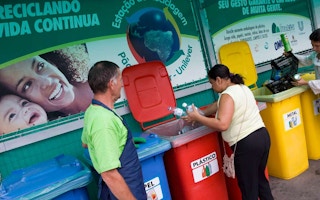Unilever, the maker of ubiquitous food, personal care and home brands such as Knorr soups, Dove soap and Domex on Saturday committed to ensuring that 100 per cent of the plastic packaging in its products is reusable, recyclable or compostable by 2025.
The company also called for the entire fast moving consumer goods (FMCG) industry to transition from a “take-make-dispose” consumption model towards a circular economy one, where products and manufacturing processes are designed to enable the easy recovery and reuse of resources after the end of an item’s life cycle. In a circular economy, plastic would be repeatedly recycled instead of ending up as trash or marine pollution.
Paul Polman, chief executive officer, Unilever, said in a statement: “Our plastic packaging plays a critical role in making our products appealing, safe and enjoyable for our consumers.”
“Yet it is clear that if we want to continue to reap the benefits of this versatile material, we need to do much more as an industry to help ensure it is managed responsibly and efficiently post consumer-use,” he added.
Currently, just 14 per cent of plastic packaging used globally makes its way to recycling plants, while 40 per cent – worth $80 to $120 billion per year - ends up in landfills.
Nearly a third of global plastics end up in fragile ocean ecosystems, and if this trend continues, there could be more plastic than fish in the ocean by 2050, according to the Ellen MacArthur Foundation (EMF), an economic research group working with Unilever on transitioning to circular economy on its use of plastics.
“
To address the challenge of ocean plastic waste we need to work on systemic solutions - ones which stop plastics entering our waterways in the first place.
Paul Polman, CEO, Unilever
To show its commitment to adopting circular economy approaches, Unilever also announced that it will establish a ‘plastic protocol’ by 2020, where it will publish the full list of plastic materials it uses in the hopes other companies will follow.
The manufacturing giant also announced that it will invest in a technical solution to recycle multi-layered sachets and to support the EMF’s New Plastics Economy initiative, a three-year global action that calls for rethinking plastics and applying circular economy principles in their use.
Dame Ellen MacArthur, EMF founder, said: “Combining upstream measures on design and materials with post-use strategies demonstrates the system-wide approach that is required to turn the New Plastics Economy into reality.”
William McDonough, architect and circular economy leader and principal founder of the William McDonough + Partners design firm said that shifting the paradigm on plastic use from current wasteful approaches to the “cradle to cradle” path is one of the greatest design challenges of our time, and is similar to scaling renewable energy to address climate change.
“The optimisation of packaging and plastics is so timely and important that all the people, communities and companies involved – suppliers, producers, retailers, customers and consumers – can work together now, with common values and purpose, to create and share beneficial value for generations to come,” he said.
Unilever’s Polman added: “To address the challenge of ocean plastic waste we need to work on systemic solutions - ones which stop plastics entering our waterways in the first place.”
“We hope these commitments will encourage others in the industry to make collective progress towards ensuring that all of our plastic packaging is fully recyclable and recycled,” Polman said.

















